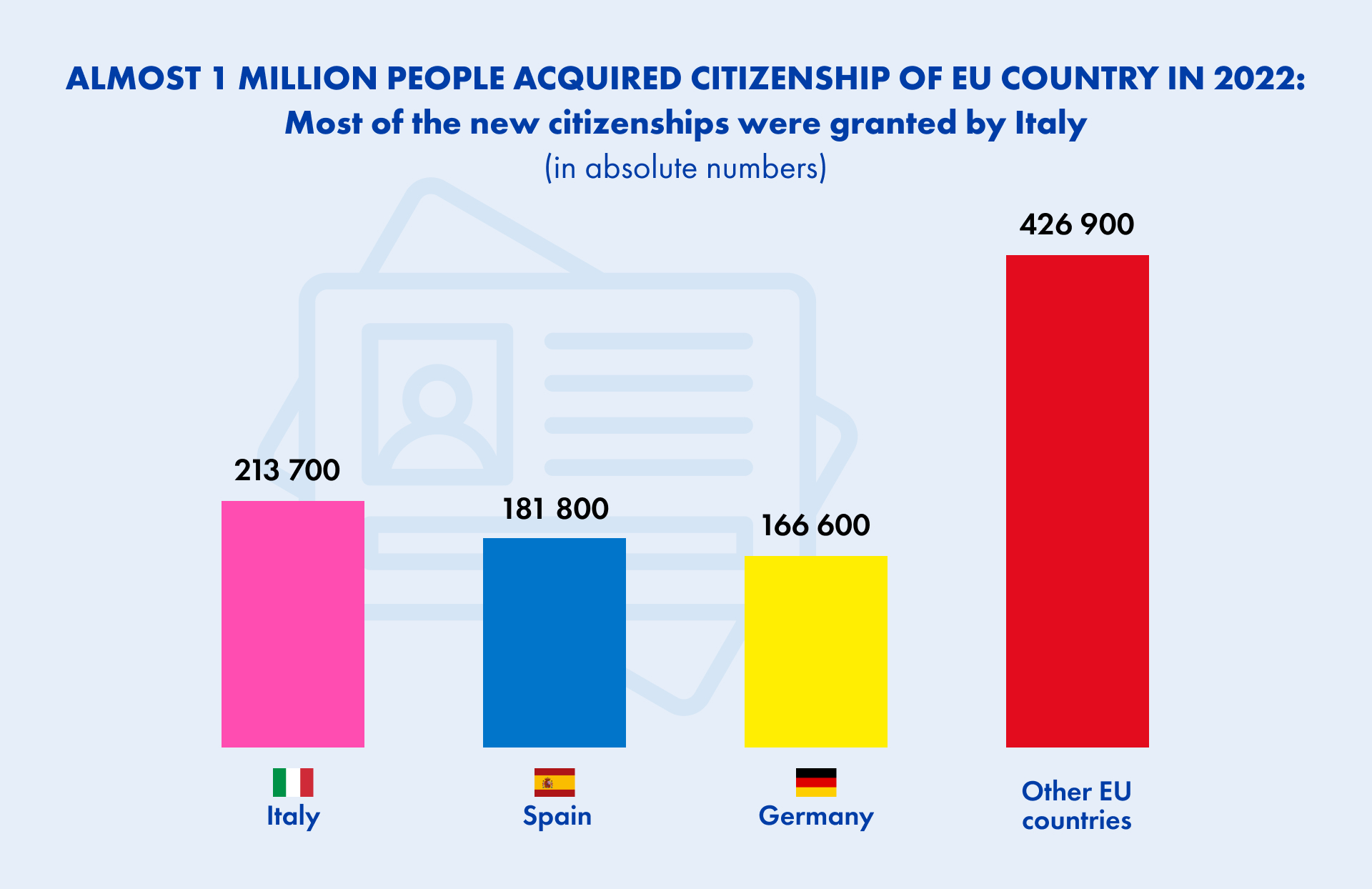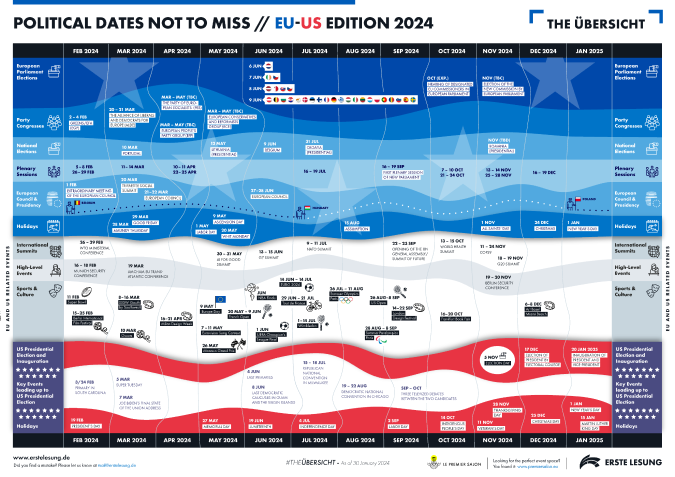Issue #158
Guten Morgen! Welcome to this edition of Krautshell, where we navigate through the intricate web of global politics and regulatory landscapes. In Brussels and Strasbourg, officials navigate farmer protests and legislative battles, while tensions between German Chancellor Scholz and French President Macron highlight European unity challenges. Meanwhile, the chaotic landscape of British politics unfolds, marked by unprecedented amendments, divisive comments, and upcoming by-elections, painting a picture of turmoil and uncertainty. So, grab your favorite beverage and join us as we untangle the threads of this week’s political and regulatory tapestry, offering insights into the ever-evolving landscape of global affairs. Anna Szilvia WHAT TO WATCH THIS WEEK: Farmers come to Brussels, MEPs go to Strasbourg This week, Brussels officials boarded the EP train from Bruxelles-Midi as the city was once again filled with protesting farmers. Instead of hearing the sounds of 900 tractors and violent clashes with the police, they were heading to Strasbourg for this month’s second plenary session. Early in the week, the MEPs voted in favour of the Nature Restoration Law, a legislative proposal that the right-wing groups in the European Parliament have been trying to reject ever since it was voted on at the committee level. The legislation aims to reverse decades of ecosystem degradation but has been caught up in a twist between ideological debates and tensions between farming and environmentalism. In the end, the opponents failed to gather enough votes to defeat the proposal, and the compromised deal between the European Parliament and the Council passed with 329 votes in favour, 275 against, and 24 abstentions. But it was particularly emotional for MEPs when Yulia Navalnaya was welcomed to the European Parliament in Strasbourg on Wednesday and addressed the plenary. In her speech, Navalnaya left no doubt as to who was responsible for the death of her husband. She said, visibly moved, Putin was a murderer and called him a “monster”. She expressed concerns that none of the EU’s current restrictive measures have stopped Russia’s aggression in Ukraine. The EU had to be resourceful and should not treat Putin as a politician but should regard him as the leader of a criminal organization and take action against his financial backers. The day after Navalnaya’s speech, the MEPs adopted a resolution that strongly condemned the murder of Alexei Navalny and gave their full support to Yulia Navalnaya in her determination to continue his work. They also adopted a resolution highlighting that the EU must support Ukraine with whatever is needed for Kyiv to defeat Russia. In other news from Strasbourg, Amazon lobbyists have been banned from the European Parliament. The ban was requested by the Parliament’s employment committee after an escalating dispute over the company’s “constant unavailability”. Amazon reportedly failed to respond to MEPs who wanted to discuss concerns about working conditions at Amazon with the company. This was seen as disrespectful to the European Parliament and EU citizens in general. The banning of a company’s lobbyists and the withdrawal of their access badges is a rare event, having only happened once before in the European Parliament. Ouch. REGULATORY INSIGHTS: Back to the roots: EU to reduce new digital legislations The Belgian Presidency of the EU Council circulated a paper on the future of EU digital policy in which it calls on the EU to stop putting out new laws for a while and rather focus on implementing already passed ones. So basically, a clear prioritization for effective implementation. With the large number of digital laws passed in the last legislative period, smooth coordination and harmonization of laws must be ensured. Besides this appeal to pause, the document deals with some flagship digital laws that have been passed recently. The regulation of AI being the trend topic of the moment, the text details the importance of cooperation between the AI office, the AI Board, and the advisory forum to implement the AI Act and foster innovative AI technologies. Speaking of trendy topics, the text also links digital transformation to sustainability and signals the importance for companies to reduce their digital footprint and e-waste. The letter also stresses the importance of harmonized standards and certification requirements, particularly in relation to areas such as AI, cybersecurity, digital identity, data sharing mechanisms and services, and the creation of common European data spaces. The proposed priorities elaborated on in the text are now being discussed by member states until March 5th. THE BIG PICTURE: Split between Berlin and Paris – Scholz and Macron clash again German Chancellor Olaf Scholz and French President Emmanuel Macron just don’t seem to be warming up to each other. The fact that the relationship between the two heads of state could be better, to say at least, has been demonstrated to the public once again this week. On Monday, President Macron welcomed a number of his European leader colleagues and government representatives to his residency in Paris for a meeting on Ukraine. In this round of 20 heads of state and government, Macron raised the possibility of sending ground troops to Ukraine. An idea that was immediately rejected by the leaders, as it would turn Western states into warring parties. Nevertheless, Macron later revived the idea in front of the press. He said that sending in grounded troops is “not ruled out”. The words were out and the bomb had exploded. At this point, Scholz had already left and the statement reached him after his return to Berlin completely unprepared. Earlier on Monday, Scholz explained publicly for the first time why Germany would not be supplying Taurus cruise missiles to Ukraine. This would require Bundeswehr soldiers to be stationed in Ukraine, which he did not want under any circumstances. Only a few hours later came the statement from Macron. Since February 2022, when the world was met with the news of Russia’s invasion of Ukraine, German strategy has been centered around one key concept: Steer clear of direct conflict with Russia under any circumstances. So it’s no surprise that Chancellor Scholz categorically ruled out the deployment of ground troops. Although Scholz’s stance is widely supported both in Germany and abroad, the open display of disagreement between Germany and France has been heavily criticised since. Now is not the time for selfish power games, it is generally agreed. After all, this was preceded by an ongoing debate and mutual accusations of insufficient support for Ukraine since the outbreak of the war. As the saying goes, when two people fight, the third is happy. And in this case, it’s Putin. To describe the last week in British politics as rather chaotic would be an understatement (even though we did in Krautshell last week). As we touched on, the drama began on Wednesday when the Speaker of the House (Parliament’s Referee) allowed an amendment from the Labour Party on a Scottish National Party (SNP) ‘Opposition Day’ motion. Now whilst that may at first not sound like such a misdemeanour, remember that British politics is built out of 1000 years of unique traditions and practises that often make no logical sense. And this really was a breaking of tradition. Cue the drama. The SNP and the Government used this opportunity to criticise the Speaker and even began murmurings of removing him from his position, with over 70 letters of no confidence submitted initially. Whilst the SNP carried this view for the rest of the week, new developments, like that Labour had threatened the Speaker’s position if he had not granted the amendment, gave the Conservatives a different angle to attack Labour. They praised the Speaker’s record and laid the blame for the chaos at the feet of Labour Leader Sir Keir Starmer MP and his Party. By the end of the week the Labour Party were also on the defensive and the Government began to think that it might be a good week in the media for them. However, reality hit on Saturday when the former Deputy Chair of the ruling Conservative Party made some divisive, and some say Islamophobic, comments regarding the Mayor of London Sadiq Khan. When he refused to apologise for those comments the Prime Minister had no choice but to dismiss him, falling into a catch-22 where he suffered criticism from his opponents for being not decisive enough, and criticism from some of his MPs for being too quick to sack him. This week also holds another by-election where it is likely an independent who is familiar with parliament and no friend to any party could win. This signals another terrible week of media for all the main parties, alongside prospect of the return of a highly controversial former MP. All the parties can hope to do is follow that British old adage of ‘keep calm and carry on’. Source: ec.europa.eu Here are three appointments for next week that you should have on your radar: Instead of this week’s WOOM, we have another goodie for you: All the most important happenings for this election year both in Brussels and the US. You can download our disruptive calendar on Political Dates Not To Miss // EU-US Edition 2024 for your office wall here. Pivotal moments shaping the political landscape on both sides of the Atlantic Ocean covered in the calendar include: We hope you’ll like it and will be back with your favorite opinion piece next week, until then: Issue #158


FIRST, SOME SOLID INTEL:
AND WHAT’S UP IN GREAT BRITAIN?
TAKE A BREAK, GIVE YOUR EYES A REST:

LONG STORY SHORT:
OUTLOOK:
When?
What?
March 05th, 2024
Generative AI Summit 2024 with Marianne Janik, CEO of Microsoft Germany and Minister of Justice Marco Buschmann, among others
March 05th, 2024
Cybersecurity Standardization Conference 2024
March 05th, 2024
“Super Tuesday” in the US primaries
WHAT’S ON OUR MINDS:

– Party congresses
– National elections
– European summits
– International High-Level Forums
– Some key Sports and Culture events to meet your (political) fans and foes…
And so much more!
